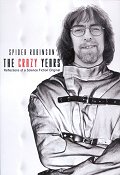After Robert Heinlein's death, several pages of notes that he wrote in
1955 outlining the idea for a novel were found, and Spider Robinson given
the task of turning them into a novel.
It's 2286. Joel Johnstone is a poor but talented musician, who is
desperately in love with Jinny Hamilton, and she with him, but they can't
afford to marry. However, Joel discovers something that makes him run far
far away, so far and so fast that Jinny can never catch up with him. The
main story is then his "coming of age" over the next several
years in a small community, finished off with a mind-blowing catastrophe,
and a hastily wrapped-up ending.
Is this a Heinlein, or a Robinson? Well, it feels a lot like a
Heinlein. In fact, it's a very strange experience, reading a novel that
feels like an early Heinlein (early enough that it's a jolly good
story, not just an interesting lecture), yet clearly, from events and
technology, written in the 21st century. It's a world initially consistent
with Heinlein's future history, so Neil Armstrong didn't happen, and
Prophet Nehemiah Scudder and the Covenant did. But it's also a world in
which 9/11 happened. And I don't remember the mind-blowing catastrophe
towards the end (you'll know it when you get to it) from Future History,
either.
There are clearly Robinson touches, such as the dancing, and, of course,
the puns. But the number of people who die, and stay dead,
definitely points to Heinlein rather than Robinson. As does the coming of
age feel, and the competent-but-naive Heinlein-esque hero. The lack of
major female characters is also typical of (early) Heinlein (the female
characters are strong, but not major).
A good page-turner, and it's marvellous to have a new Heinlein novel to
read. Well done Spider!









